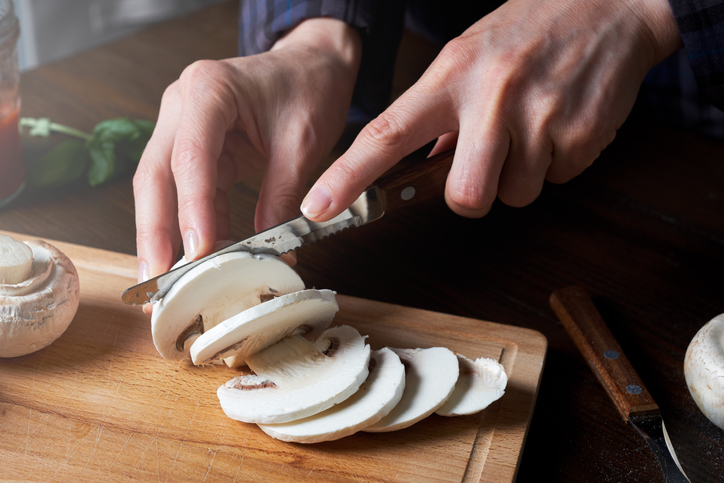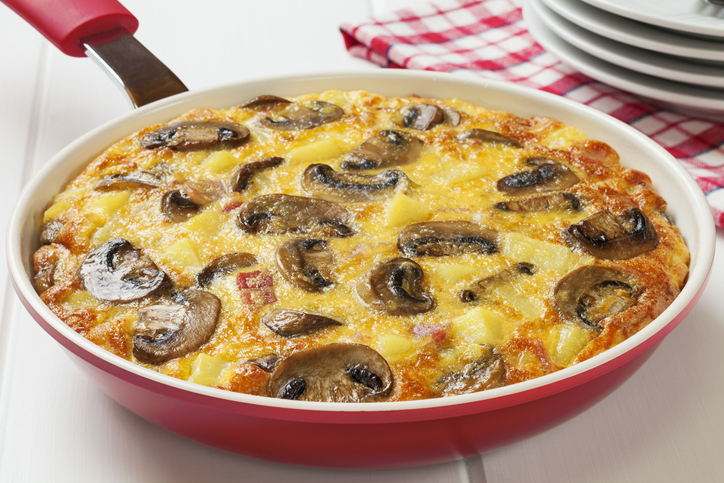The Magic of Mushrooms In Cancer Prevention

By Joy Stephenson-Laws, J.D., Founder
In my opinion, mushrooms are one of those foods you either love or hate. For example, you either love their earthy, bold flavor and chewy texture (when cooked) or perhaps you cannot get past the fact that if you eat mushrooms you are eating a fungus.
I love mushrooms. They are versatile and can easily add depth to any dish. I saute them and add them to omelettes and stir frys, thinly slice them raw and throw them in a salad.
I have previously blogged about the potential benefits of eating mushrooms. What is particularly special about mushrooms is that they are one of the few non-fortified food sources of vitamin D (which is a nutrient that is essential for bone health and may help prevent acute respiratory infections). They are also a good source of plant-based protein and may even aid in cancer prevention.
If you are not the biggest fan of mushrooms, I’m hoping the following information will change your mind. Remember that there are many different types of edible mushrooms and many different ways to prepare them. Perhaps you just need to experiment with them more and try new dishes and recipes.
According to a new study conducted by Penn State University, consuming a higher amount of mushrooms may be associated with a lower risk of developing cancer.
This Medical Xpress report which discusses the study states that the researchers analyzed 17 cancer studies (published from 1966 to 2020). They looked at data from more than 19,500 cancer patients and the connection between mushroom consumption and cancer risk.
Basically, the results revealed that people who consumed 18 grams (which is really not a lot, less than a cup) of mushrooms daily had a 45 percent lower risk of cancer compared to people who did not eat mushrooms.
"Mushrooms are the highest dietary source of ergothioneine, which is a unique and potent antioxidant and cellular protector," said one researcher.
"Replenishing antioxidants in the body may help protect against oxidative stress and lower the risk of cancer."
It is interesting to note that even though "shiitake, oyster, maitake and king oyster mushrooms have higher amounts of the amino acid ergothioneine than white button, cremini and portobello mushrooms, the researchers found that people who incorporated any variety of mushrooms into their daily diets had a lower risk of cancer.”
What is even more interesting about this study is that they found this mushroom consumption and lower cancer risk association was particularly evident with breast cancer. This is because the majority of the cancer studies analyzed involved breast cancer. But the main point is that mushrooms may be a great addition to an anti-cancer diet due to their ergothioneine content.

“Ergothioneine is a natural amino acid with antioxidative properties. It prevents cellular stress, which can lead to brain diseases, neurological damage and cancer. In rats and roundworms, research shows that ergothioneine has promising effects in preventing neurodegenerative diseases such as dementia and Alzheimer's,” according to one report.
“Also, it has been reported that patients suffering from neurodegenerative diseases have significantly lower blood levels of ergothioneine than others. These findings suggest that ergothioneine might have great potential as a vitamin to prevent or delay the onset of those diseases.”
Still not on the mushroom bandwagon?Ergothioneine is also found in red and black beans. If you can eat a portabello black bean burger, you may really be on to something! You may also want to pile your burger high with additional nutrient-dense, plant-based foods such as avocado, tomato, greens and grilled onion.
The good news is that in general you can help protect your body against all forms of cancer and other serious diseases such as dementia by eating plenty of whole foods that are rich in vitamins and minerals (antioxidants). These foods help diminish inflammation throughout the body, which is believed to be one of the main contributors to all types of cancer. Avoiding processed and ultra-processed foods is imperative (these foods are inflammation promoting), and eating plenty of vegetables and fruits is key.
Several reports say that almost 40 percent of cancer deaths can be prevented with lifestyle changes. This means that it is extremely important to:
- Maintain a healthy weight and body composition by exercising regularly and maintained a balanced, nutrient-rich diet
- Avoiding smoking
- Drinking alcohol in moderation (if at all)
- Maintaining nutritional balance by eating healthily and taking routine nutrient tests. If you discover that you have too much or too little of a particular nutrient, a competent healthcare professional can help you make the necessary dietary changes and recommend quality supplements if necessary.
- Protect yourself from the sun
- Get regular medical check-ups (especially if you have existing health issues such as diabetes and heart disease and/or a family history of cancer)
As always, consult a competent healthcare professional about what foods you are including in your diet, especially if you have existing health issues, are pregnant or are breastfeeding.
You might also want to talk to your doctor about the possibility of taking an ergothioneine supplement, but know that eating healthily consistently is invaluable to overall health and wellbeing. Good nutrition always tops supplementation (this is why they are called supplements).
Enjoy your healthy life!
Disclaimer: This article is not intended to provide medical advice. Please consult with your doctor or another competent healthcare practitioner to get specific medical advice for your situation.
The pH professional health care team includes recognized experts from a variety of health care and related disciplines, including physicians, attorneys, nutritionists, nurses and certified fitness instructors. This team also includes the members of the pH Medical Advisory Board, which constantly monitors all pH programs, products and services. To learn more about the pH Medical Advisory Board, click here.







